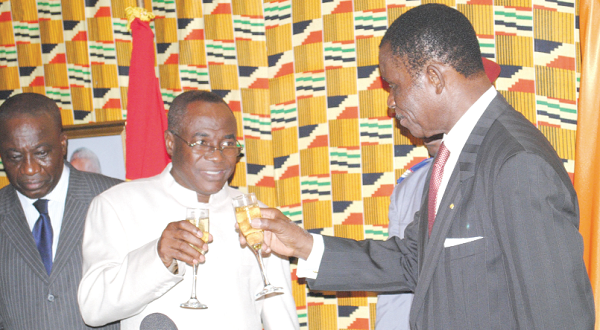Ghana, model of peace, democracy — Envoy
 Ghana’s democratic credentials is an example worth emulating and a challenge to Cote d’Ivoire, the Ivorian Ambassador to Ghana and Togo, Mr Bernard Ehui-Koutoua, has said.
Ghana’s democratic credentials is an example worth emulating and a challenge to Cote d’Ivoire, the Ivorian Ambassador to Ghana and Togo, Mr Bernard Ehui-Koutoua, has said.
Advertisement
“We Ivorians admire Ghana, which is standing out as a model of democracy and peace,” the ambassador said at a cocktail event in Accra to celebrate Ivorian national day.
In a speech that touched on the progress of the country after its political hiccup in 2010/2011, Ghana-Cote d’Ivoire relations and Ivorian diplomacy, Mr Ehui-Koutoua said the responsible way Ghana handled the political transition after the death of President J.E.A. Mills and the 2012 elections gave credence to President Barack Obama’s statement that Africa did not need strong men but rather strong institutions.
On August 7, 1960, Cote d’Ivoire gained full independence from France, after being a colony for more than 120 years.
August 7 is, therefore, packed with cultural activities and parties. Military parades and processions are also held in the capital city, Yamoussoukro.
In the years after independence in 1960, the country became known as a citadel of peace and prosperity in an otherwise turbulent West African region.
It blossomed on cocoa wealth. Investment flowed in and the Ivorian miracle became the envy of the continent.
But a coup in 1999 and a bloody civil war in 2002 and post-election violence in 2010/2011 turned the dream into a nightmare.
Progress after turmoil
Recollecting the country’s headway after its stormy recent past, Mr Ehui-Koutoua said a national reconciliation was ongoing with a Dialogue, Truth and Reconciliation Commission to strengthen the social, ethnic and community ties that were strained by the crisis.
That was in addition to a Permanent Consultative Framework (CPC) established by the government to keep the country in dialogue.
“The purpose of these two bodies is to establish the right conditions for living together by gathering all Ivorians in order to get them involved in the post-crisis reconstruction.”
He said while it was the priority of President Ouattara to ensure that Ivorian refugees returned to their homeland, that priority would not be allowed to be an obstacle to the rule of law in the country.
“As a matter of fact, a sustainable peace requires that we write the dark page of the hardship we have just gone through for history not to repeat itself.”
On the economy, he said, the country had made remarkable recovery with its subscription to the Highly Indebted Poor Countries (HIPC) initiative which had ensured that a large chunk of its debts were written off while gross domestic product forecast showed a positive trend of 4.7 per cent in 2011, 8.1 per cent in 2012; 9 per cent in 2013 and 10.1 in 2014.
With a highly polarised army to deal with, the ambassador said, reforming the army, strengthening and rehabilitating the country’s security services and equipping them to protect the people while creating a viable economic environment were the country’s other priorities.
Responding to a toast, the leader of government delegation to the event, Mr Joe Oteng-Adjei, the Minister of Environment, Science, Technology and Innovation, said Ghana would continue to support Cote d’voire to continue its path of peace and progress.
“Ghana is better off with a prosperous Cote d’Ivoire than a conflict-prone nation. This is why we’ll continue to work with you to achieve peace and unity,” he said.
He applauded President Ouattara for leading peace efforts in Mali and Guinea Bissau—two West African countries reeling under political crisis.
Mr Oteng-Adjei expressed appreciation to the Ivorian government for its support during the death of President Mills.
By Seth J. Bokpe/Daily Graphic/Ghana




